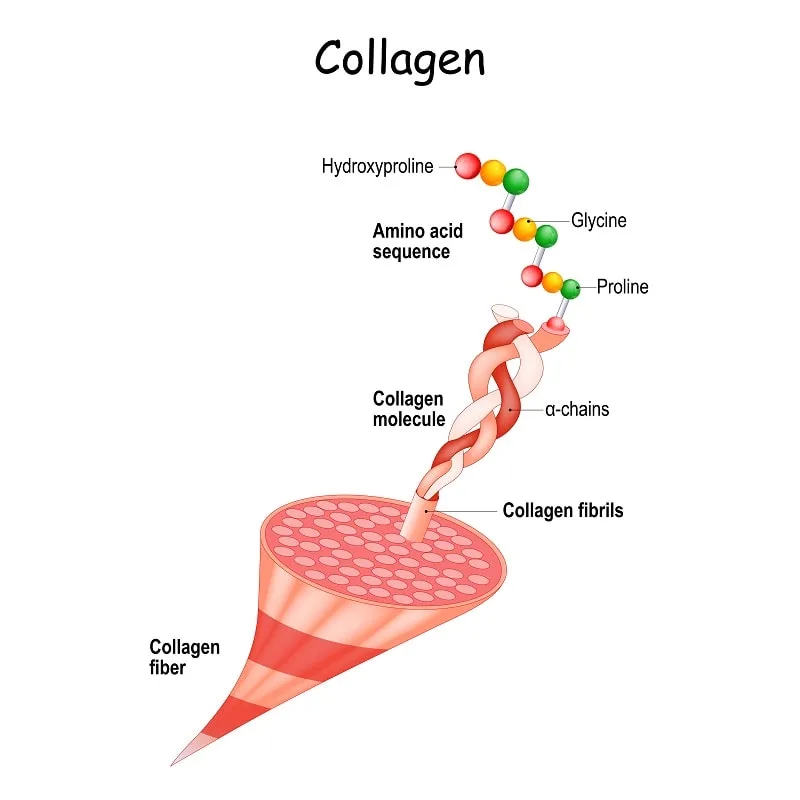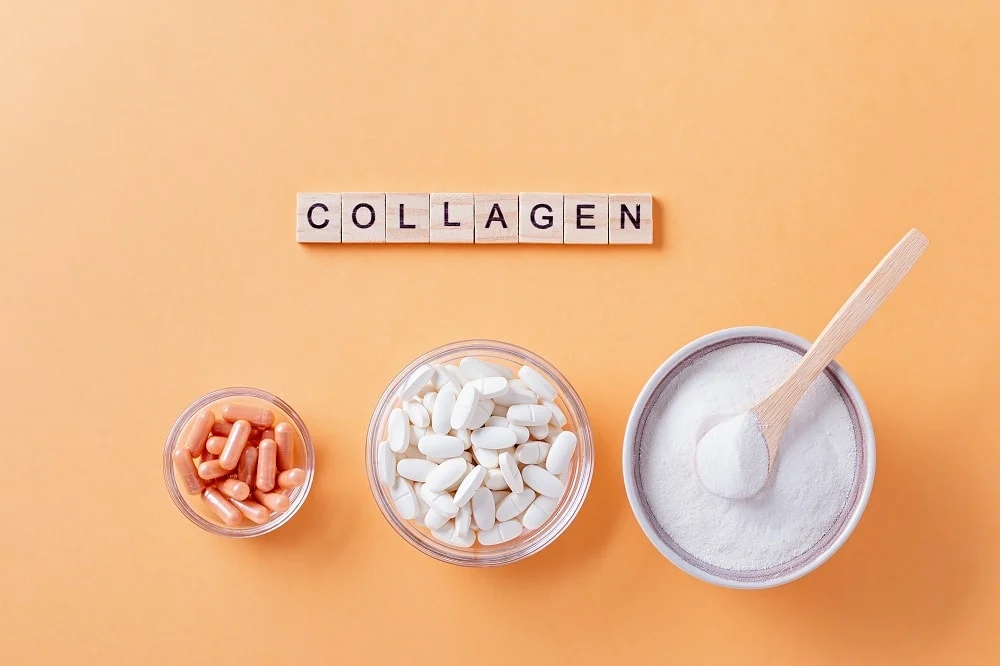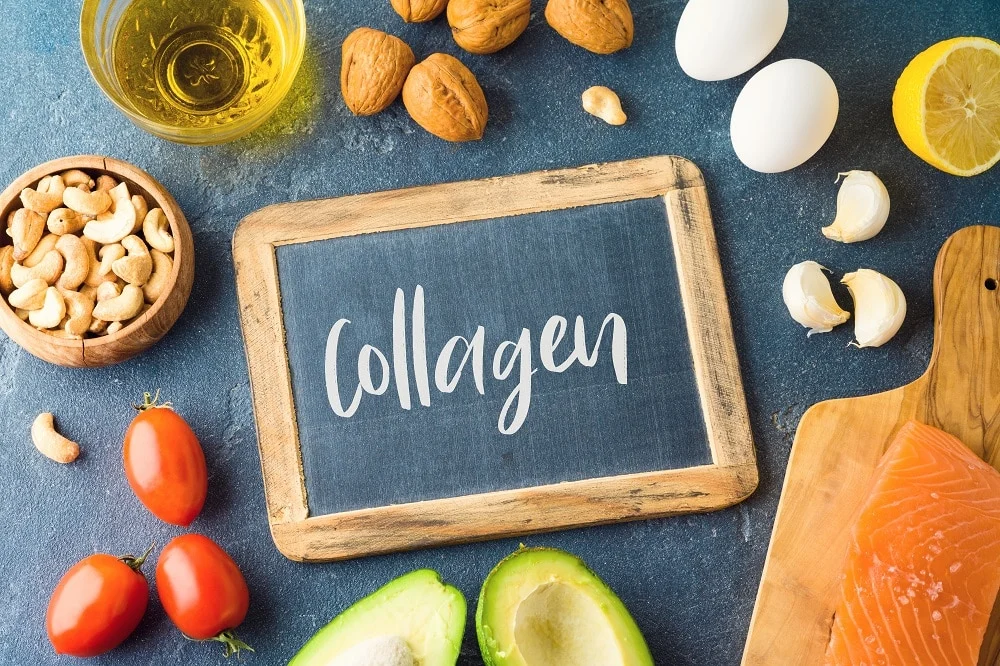Cue the commercial featuring a woman shaking out her luscious locks of hair. Have you ever aspired to have a head of long healthy hair like those we see on TV and in magazines? Meet collagen! It plays a crucial role in the health and growth of your hair.
Or maybe your goal is to simply maintain your current hair status, with any improvement considered an added bonus. Collagen can do that too! It has been shown to promote hair growth, reduce the graying of hair, and repair damaged hair.
What is Collagen?

Collagen is a protein naturally made by our bodies. It is composed of amino acids that build keratin, the protein that makes up the hair.
The benefits of collagen include maintaining healthy hair, skin, bones, and nails. Whereas, the deficiency can cause dry and brittle hair, hair thinning, and loss.
That said, the FDA does not regulate dietary supplements, so always check the label and consult with your doctor before taking supplements.
What Causes Collagen Loss in Hair?

Several factors may be to blame for collagen deficiencies. Aging, unfortunately, is one major factor in collagen loss over time. Understanding what else affects its levels and how to offset the decline is vital as you age.
Stress can cause collagen loss in hair and skin. The body will divert blood and energy to vital organs, like the brain and heart, in a stress response. This diversion, over time, lessens your skin and hair’s ability to produce this crucial protein.
Additionally, an unbalanced diet and high sugar intake can decrease the levels. Balancing your diet with a conscious effort to eat collagen-rich foods and reducing sugar intake can help.
Environmental and lifestyle factors can cause collagen loss in hair as well. High levels of UV Rays can decrease collagen production, so always apply sunscreen when outside for a prolonged amount of time. Smoking is another reason the production may decrease.
Benefits of Collagen for Hair
Collagen has many benefits throughout the body. Primarily, it is crucial to the health of your hair, skin, bones, joints, muscles, and nails. It is a protein containing amino acids that makeup keratin, a protein that makes hair.
More specifically, it protects the skin that produces the hair root. Hair root health is necessary for maintaining the color of your hair and presenting hair thinning and loss.
Healthy hair follicles rely on collagen not only for the production of hair growth but also for pigment production. Healthy hair follicles can reduce gray hair production and repair hair damage.
It increases the body’s hair-building proteins resulting in longer, thicker hair. It can reduce split ends and hair dryness that causes further damage.
Even more, collagen can have a neutralizing effect on free radicals. Free radicals are unstable molecules in the body’s cells. They can have positive or negative results, depending on their source.
The accumulation of free radicals from an outside source, such as UV rays or pollution, can cause aging, wrinkles, and dry, brittle hair.
How To Use Collagen for Hair

Now that you know all of benefits, you must be curious about how to use collagen for hair. Thankfully, our bodies naturally produce this protein. However, through aging, poor diet, and environmental factors, the production can decrease in the body.
Supplements may be beneficial if you are experiencing the side effects of a lack of collagen. This protein is widely accessible through foods and supplements. Adding collagen-rich foods to your diet is an easy way to consume them.
Another way to add it to your diet is by consuming it as a supplement in a liquid or powder form. These supplements are effortless to include in your daily routines. You can add them to your morning coffee or smoothie, for example.
You can also make moisturizing hair masks with hydrolyzed collagen. Furthermore, collagen-filled hair products are available to use to increase its production. However, they do not work as effectively as supplements. The body does not absorb it through topical application.
Hair products may repair damaged hair strands or follicles, and healthier follicles can increase growth and healthy hair. However, these hair products don’t directly increase collagen production in your body.
Keep in mind that supplements, or increasing collagen in your diet, do not help your hair overnight. It may take three to six months to see differences in your hair.
How To Prevent Collagen Loss in Hair
Collagen loss can cause the hair to thin or turn gray over time. There are a few ways to combat the loss in hair before it starts.
Living a healthy lifestyle, including a balanced diet, is a step in preventing collagen loss in hair. Eating a balanced diet with enriched foods ensures that your body has all it needs to keep your hair healthy.
Other lifestyle choices that lead to collagen loss are smoking and overexposure to UV Rays. So avoid smoking. UV rays are harmful to collagen levels. To combat sun exposure, you can wear SPF when outside.
Supplementing may be helpful or even necessary when collagen production dips. Always follow doctor and label recommendations when taking supplements. Headaches, stomach issues, and fatigue are symptoms of taking too much of the supplement.
Collagen-Rich Foods for Hair

Eating a healthy, balanced diet is key to maintaining collagen production. The first step you may want to take to increase production in the body is eating collagen-rich foods. It is an effective way for your body to ingest and produce collagen across the body.
Collagen-rich foods include:
- Bone broths
- Animal meats
- Salmon
- Chicken
- Egg whites
- Leafy greens
- Nuts
- Beans
Frequently Asked Questions
It’s natural for questions to arise when you set out to use collagen for hair to boost its health. Here are some of the most common questions people ask.
Type I is best for hair health and growth. This type of collagen is from marine or bovine sources and has the most amino acids, like proline. These amino acids are essential for your skin, hair, and bones.
Lacking collagen can damage hair, and taking supplements might be a good solution for you. Keep in mind that when supplementing collagen, your body will distribute them where it feels like it needs it.
Skin and bones may get priority. It can take a while to see any effect in your hair while your body takes care of other areas that also need protein.
Collagen and biotin both support healthy skin, nails, and hair. Collagen is a protein produced in the body, whereas biotin is a vitamin not found in the body. Foods or vitamin supplements are the only way to get biotin.
Each work to support healthy skin, nails, and hair. One is not necessarily better than the other. You can even take both supplements to stimulate the health of your hair. Always check with your doctor and follow their recommendations.
No. Side effects from collagen are rare. Consult your doctor before adding any supplements to your routine, and always follow doctor and label recommendations.
Collagen taken appropriately is safe. However, consuming too much can produce uncomfortable side effects. You may experience bloating, heartburn, or feeling full. There are also some rare complaints of diarrhea and constipation.
If you have food allergens, make sure to choose a supplement that doesn’t contain those allergens. Dietary supplements are not FDA regulated, so they could have ingredients you don’t want. Check the label and consult your doctor before taking supplements.
Collagen does not directly thicken your hair. It strengthens the hair follicle. Strong, healthy hair follicles can grow thicker hair.
Collagen can take up to three to six months to show differences in hair growth. Collagen will go to the highest need areas of the body first when there is a deficiency. Your body may direct collagen to skin, bones, joints, and muscles before your hair.
Collagen supplements are probably safe to take during pregnancy, but there is limited research on the effects on pregnant women. Always consult with your doctor before taking any supplements.
Collagen-rich foods are great during pregnancy. Many of these foods are safe during pregnancy and highly beneficial to mom and baby.
Shampoos or conditioners can be powerful hydration but are not as strong as ingesting them. Bovine, poultry, and marine collagen are three sources of collagen in beauty products.
It is found naturally from these sources, but there are also vegan versions of the supplement. Scientists can genetically alter yeast and bacteria to create collagen.
Yes. Collagen peptide shampoos and conditioners are safe. The collagen in these products does not work the same as ingesting it. It is beneficial for your hair, and it will moisturize.
Both of these positively affect your hair, but they do different things. Keratin helps maintain healthy hair, and collagen treats the hair follicle.
Collagen helps to improve the hair follicles preventing gray hair, thinning hair, and hair loss. Keratin can repair breakage, split ends, and dryness.
Conclusion
Collagen can be very beneficial to the growth and appearance of your hair. Supporting and protecting the hair follicle is crucial to the health of your hair. The hair follicle is where color is produced and plays a vital role in thicker hair and hair loss.
Human bodies make collagen naturally. Due to age and some lifestyle or environmental factors, it can decrease in our bodies over time.
It is widely accessible through foods or supplements. You can take supplements as a liquid, powder, or pill. Consult a doctor and check the label before taking any supplements.
You May Also Like
- Cutting Split Ends
- Shampoos and Conditioners for Dry Hair
- Unsafe Hair Care Products During Pregnancy
- Hair Thickening Serums
